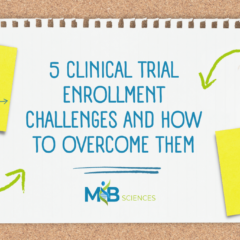Sponsors Should Act Now To Increase Diversity in Clinical Trials Before FDA Requires It
Increasing diversity in clinical trials is a critical part of improving health equity. In addition to ensuring the effectiveness of therapies across specific populations, diverse participation in clinical trials also expands access to potentially life-saving treatments.
While the FDA has previously published detailed guidance on how to achieve this with diversity plans, the latest omnibus bill includes legislation that will make these plans a requirement. Although the FDA has not yet released its final guidance that will become law, sponsors at drug and medical device companies should be taking steps now to prepare.
Here’s what sponsors need to know.
What is the FDA’s role in increasing diversity in clinical trials?
The FDA acknowledges racially and ethnically diverse populations are frequently underrepresented in clinical research in the United States, despite being disproportionately affected by some of the diseases drugs and devices are intended to treat. The FDA has issued several non-binding recommendations on how to improve clinical trial diversity, including a guidance document published in October 2016 recommending that clinical trial sponsors submit a Race and Ethnicity Diversity Plan “to enroll representative numbers of participants from historically underrepresented racial and ethnic populations” in applications for a new drug or medical device.
The agency expanded upon its original guidance in a 12-page document released in April 2022.
While the latest guidance again included only recommendations and not requirements, it mentions two existing legislative proposals: House Bill 6584, the Diverse and Equitable Participation in Clinical Trials (DEPICT) Act, and House Bill 5030, the Diversifying Investigations Via Equitable Research Studies for Everyone (DIVERSE) Trials Act. These initiatives include a requirement for the FDA to update its existing guidance or issue new guidance on diversity action plans within 12 months, according to a Pink Sheet analysis. They must then issue final guidance within nine months after the end of the public comment period, which is typically 60 days.
When are Race and Ethnicity Diversity Plans required?
The proposed legislation requires drug and device sponsors to submit formal plans no later than their submission of protocol for a Phase III pivotal study. For drug trials, the FDA’s April guidance recommends submitting a plan during drug development and asking the FDA for feedback during a meeting.
For medical device trials, sponsors should submit their diversity action plan along with the investigational device exemption (IDE) application.
There could be exemptions for this requirement in some circumstances, such as a public health emergency.
What should diversity plans include?
The FDA’s April guidance outlines specific elements that should be part of the plan for increasing diversity in clinical trials, including:
- An overview of the disease or condition the trial aims to treat, and any available data on its prevalence within underrepresented racial and ethnic populations
- The scope of the trial, including the study design, study population, endpoints and geographic locations
- Enrollment goals for underrepresented racial and ethnic participants, including pharmacokinetic (PK), pharmacodynamic (PD) and pharmacogenomic data that may impact how trial participants respond to drugs, and plans to increase enrollment among key populations
- Data on factors that may impact device performance, such as variations in skin pigmentation
- How researchers will assess race and ethnicity in addition to other variables that may affect the safety and effectiveness of the drug or device
- Any study design features that may be in place if existing data indicates the drug or device may affect trial participants differently based on factors involving race or ethnicity
- The sponsor’s plan to collect data to explore potential differences in drug or device effectiveness that may be associated with race or ethnicity throughout the product’s lifecycle
It’s important to note there may be additional requirements in the new guidance the FDA is required to submit before the end of 2023. However, these are factors clinical trial sponsors should already be considering, and taking the time to carefully document them will put them on a path toward compliance when the agency does release final requirements.
What are the consequences for failing to comply with clinical trial diversity requirements?
While the final omnibus bill did not grant the FDA authority to require additional studies or surveillance for clinical trials that did not meet diversity requirements, the agency has included provisions to ensure diverse populations are adequately represented in postmarketing requirements for several cancer drugs, according to the Pink Sheet article.
Failing to include adequate representation from diverse populations in ongoing or upcoming clinical trials could potentially delay approval or cause a drug or device to be rejected.
How can M&B Sciences help?
With the vast majority of clinical trials experiencing delays due to enrollment, recruiting a sufficient number of participants from underrepresented populations requires a strategic approach. First, sponsors need to understand health trends and demographic data to be able to effectively target recruitment efforts. They also need to be aware of barriers that may prevent people from certain populations from participating in trials, including a lack of access to healthcare resources, language barriers, lack of familiarity with the process, and potential skepticism. Finally, they need to maintain frequent communication with patients throughout a trial to answer questions that may arise, build trust, and promote retention throughout the trial lifecycle.
With decades of expertise in spatial epidemiology and a well-established network of community partners, the M&B Sciences team is uniquely equipped to help sponsors identify relevant patient populations and support patient recruitment. Our Neighborhood Trials mobile app makes it easy for patients to find and participate in trials close to home, while the patient recruitment platform simplifies screening and enrollment for sponsors.
We also provide 24/7 support and concierge services to patients throughout the trial so you can stay focused on achieving compliance and earning approval. Contact us to learn more about how our team supports your goals.
Learn more about Improving Diverse Patient Recruitment in Clinical Trials with Community Outreach and Technology by reading Dr. Martin’s latest feature on Biocom California.



